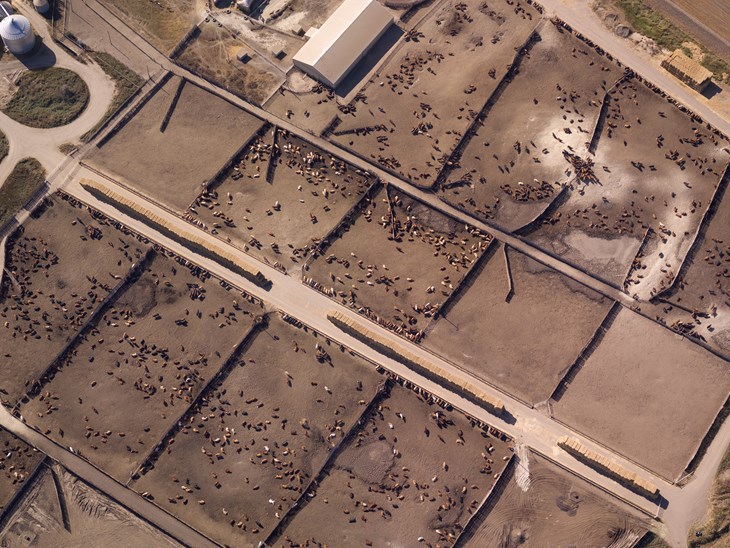1/22/2025
by CIWF US Team
The recent op-ed "To save the planet, stop eating free-range beef" advocating for abandoning free-range, organic beef in favor of industrialized factory farming is a deeply flawed and dangerous perspective. Whether intentional or not, the author's argument pushes for a system that endangers small-family farmers, further entrenches corporate control of agriculture, and perpetuates a food system that harms billions of animals, devastates the environment, and exploits rural communities and farm workers.
Factory farms are a leading driver of environmental destruction, climate change, and air, water, and soil pollution. These operations rely on an industrial model of agriculture that prioritizes profit over sustainability, emitting enormous quantities of greenhouse gases, polluting waterways, and contributing to habitat destruction. Monocropping for animal feed production depletes soil health, reduces biodiversity, and relies on harmful chemical fertilizers and pesticides. Methane emissions from manure lagoons—an essential part of the factory farm model—are a significant source of nitrous oxide, a greenhouse gas over 200 times more potent than carbon dioxide. Simply put, they are not a climate solution—they are the problem.
We must also consider the broader implications of promoting factory farming. This system thrives on the commodification of animals, treating them as production units rather than thinking and feeling beings. Factory farms confine animals in appalling conditions, cramming them into spaces so tight they can barely move. Additionally, the reliance on antibiotics to keep animals alive in unnatural environments is driving the global antimicrobial resistance crisis, which is on track to kill 10 million people annually by 2050. These are not just ethical issues but public health and environmental crises.
Factory farm systems are defined by cruelty, subjecting animals to lifelong misery which is a betrayal of our moral responsibility to recognize animals as living creatures with intrinsic value and dignity. The author's argument, devoid of any ethical considerations for these abused farmed animals, risks propping up a food system that perpetuates immense suffering while devastating our planet.

Suggesting that grass-fed practices are worse for the planet completely ignores the whole picture. Small-scale, regenerative farming systems—often mislabeled as inefficient—work with nature rather than against it. These systems promote healthy soils, sequester carbon, and promote biodiversity. They are not a silver bullet for climate change but offer a path to a more sustainable and ethical food system. By contrast, factory farming depends on deforestation for feed crops like soy, undermining any supposed environmental benefits of its efficiency.
This narrative also neglects the plight of small family farmers. By promoting factory farming, we further entrench a corporate-dominated system that squeezes out independent producers by promoting factory farming. The idyllic vision of a farmer caring for their animals is not just a marketing ploy—it represents a way of life that values stewardship, community, and respect for the land. Abandoning this in favor of concentrated corporate operations will only deepen rural poverty and destroy local economies.
The argument that industrial agriculture has reduced land use per capita misses the point. The expansion of factory farming comes at the expense of ecosystems, communities, and the animals themselves. Producing "more food on less land" has fueled global inequities, with the overproduction of cheap meat and dairy disproportionately affecting low-income communities that bear the brunt of pollution and health risks. Moreover, the inefficiencies of feeding animal-sourced foods to people exacerbate this issue. Producing plant-based foods for direct human consumption uses significantly less land than intensive animal agriculture ever could, offering a more sustainable and equitable solution to global food security challenges. Intensive animal farming is not progress—it is exploitation.
We must reject the false dichotomy that factory farming is a viable solution to feeding a growing population. Instead, we must wholly reimagine our food system to prioritize sustainability and compassion. Supporting regenerative farming, reducing food waste, and transitioning to plant-forward diets are proven strategies to reduce agriculture's environmental footprint.
The misguided conclusion—that we should embrace factory-farmed beef to save the planet—could not be more dangerous. Factory farming is the status quo, driving us toward environmental collapse. Doubling down on this system will not save the planet; it will hasten its destruction. The true solution is ending factory farming and recognizing that how we treat animals, and the environment reflects who we are as a society.

